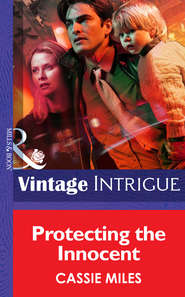По всем вопросам обращайтесь на: info@litportal.ru
(©) 2003-2025.
✖
Murder on the Mountain
Автор
Год написания книги
2019
Настройки чтения
Размер шрифта
Высота строк
Поля
A chirpy little voice whispered in one ear, “Go on the date. Paul’s a good-looking man. Have some fun for a change.”
In the other ear was a stern professional tone. “Paul is too smart. He’ll figure out that this is a safe-house. Your career will be ruined.”
She couldn’t take that chance. Julia had worked too hard to get to this level. Her FBI career was her whole life.
“That’s pathetic,” said the chirpy voice that sounded a little bit like her mother. “You’re thirty-two years old. Don’t you want to have a family? Children of your own?”
Paul already had a family. Two girls.
Julia shook her head. She was getting way ahead of herself. He hadn’t asked her to marry him, after all. It was only a date.
David Dillard, the FBI computer specialist, saun-tered into the kitchen. “Any coffee left? I’m going to be up late.”
“I was just about to make a fresh pot.” Julia and the other two agents at the safehouse would be staying up all night in shifts to monitor the surveillance cameras that were posted in the hallways and outside. To stay alert, caffeine was a necessary evil.
David pushed his glasses up on the bridge of his nose and took a seat at the kitchen table. Of all the Homeland Security specialists who were staying here, she liked David best. He was an average looking guy—pleasant and unassuming. “This is a excellent facility,” he said.
“You’ve hardly been outside.”
“I was talking about the lower level.”
“The basement? But it’s all white and sterile.”
“For a computer geek like me, that’s heaven.”
To each his own. Julia spent as little time as possible in the basement where the charming, rustic lodge transformed into a high-tech operation with computers, communication devices and surveillance monitors. Most of the meetings for the Homeland Security group would take place in a bland windowless room on the lower level.
“I thought you brought your own computer with you,” Julia said. “And that collapsible screen thing.”
“Tools of the trade.” He gave her a weary grin. “I’m setting up a series of simulations over the next several days.”
“Simulating what?”
“Our project is to establish a protocol for first response teams handling crisis situations. We want to set up five-person teams of experts who can step in and run things in the chaos following a disaster. They would be the ultimate authority.”
Thus far, no one else had bothered to explain the purpose of this meeting. Though Julia had been curious, she was accustomed to FBI people who played it close to the vest. Apparently, David didn’t have reservations about talking.
“Isn’t there already a chain of command?” she asked as she ground the fresh beans for coffee.
“Too many commanders,” he said. “That’s the problem. The people who are here represent various authorities. The senator to handle political issues. The general for military. RJ is a financial specialist. I’m a communications person. And, of course, there’s Gil representing the CIA.”
“What’s Gil’s specialty?”
David shrugged. “He looks like an assassin to me.”
A charming thought. But she suspected David was correct. The sneaky but muscle-bound Gil Bradley looked like the kind of guy who could be dropped behind enemy lines to take out the opposition.
“What kind of crisis would you deal with?” she asked.
“There’s the obvious big stuff, like a terrorist bombing. I have that simulation set up for the last day, and it’s got really amazing effects. But there are smaller issues. Attacks on a high-profile target, like the Golden Gate bridge. A siege at a survivalist compound. Hostage-taking.”
Julia shuddered as she watched the coffee slowly drip through the filter into the pot. “That’s the worst,” she said. “Hostages.”
When it came to her own personal safety, she was fearless. But a threat to someone she loved? To her mother and father? She remembered the horror and pain she’d felt when she learned of her older brother’s death three years ago. He’d been a Marine. In harm’s way.
“Setting up an official response team is an exciting project,” David said. “On paper, it looks like a snap. The problems come in dealing with all these authoritative personalities. Like the general, for example. His plan is always the same—Send in the Marines.”
“Like my brother,” she said. “He was a Marine.”
“No kidding,” David said. “Mine, too.”
“So you know that the Marines are well trained for crisis.”
“If it’s a military crisis, yes. But there’s so much more to consider. RJ with her financial expertise brings a whole different perspective.”
The aroma of brewing coffee filled the kitchen. “What do finances have to do with homeland security?”
“If you close down the money spigot, the terrorists are left high and dry.”
The coffee was done, and she poured a mug for David. “Thanks for the explanation. It’s nice to have some idea about what’s going on.”
“Simulations are only half of what we’re doing. There’s also going to be team-building stuff.”
“So you’ll all learn to like one another?”
“That’s too much to hope for,” he said with a wry grin. “We’ll be doing well if we don’t all kill one another by the end of the week.”
He grabbed his coffee and disappeared into the lower level. Julia probably should have followed him. There were daily reports she needed to file, but they weren’t due until morning and that computer work would give her something to do while watching the monitors.
In spite of the coffee, it was nine o’clock when she fell into bed exhausted. Her alarm was set for three, when she was scheduled to take her shift at the monitors.
When she closed her eyes, her thoughts immediately flashed on Paul Hemmings. In her mind, she saw his chocolate eyes and the deep dimples in his cheeks. And his body. His large muscular body.
Her arms wrapped tightly around her pillow, and she imagined what it would be like to embrace him. It would take at least three pillows for that simulation.
It wasn’t safe to feel this way. If only he hadn’t asked her out, she could dream about Paul without regret. But he wanted to see her again, and that might be her undoing.
THE NEXT MORNING, everyone was up early except for the general, which seemed odd for a military man who ought to be accustomed to morning exercises. Julia was a bit worried when she stood outside the locked door of the general’s bedroom and knocked. “Sir? Are you awake?”
She pressed her ear against the door and listened. There was no sound from inside.
Though she hated to disturb his privacy, Julia unlocked the door to the general’s bedroom.
He was flat on his bed, dressed in his uniform with medals and ribbons arrayed across his chest. In his right hand was his Colt Double Eagle handgun. General Harrison Naylor had shot himself in the head.
Chapter Three
Early Sunday morning, Paul had the girls loaded in the Explorer and on their way to another practice session at the ice-skating rink near Vail. The kids had a performance tonight, and their coach wanted to use every possible minute on the ice for practice.











